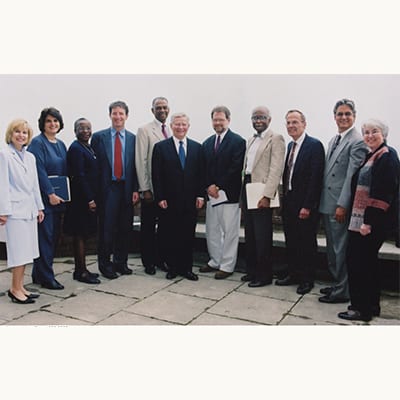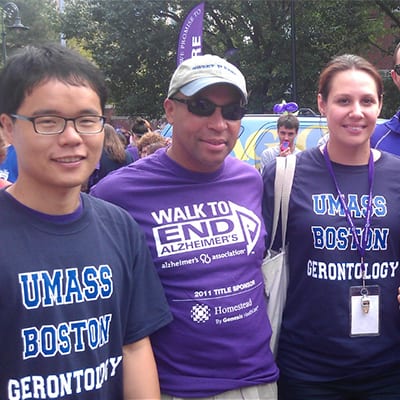Four decades of leadership in gerontology
Since its establishment in 1980, the gerontology program at UMass Boston has built a global reputation with expertise in policy, equity, financial security and other areas of focus. The Gerontology Institute, founded in 1984, makes an impact locally, nationally, and globally as the research, service, and community engagement arm of the gerontology enterprise at UMass Boston. In 1989, the Department of Gerontology became the second university in the world to offer a doctorate of gerontology. Read on for more highlights over the years.
Pictured above: William Bulger, president of the University of Massachusetts system from 1996-2003 (center), with speakers at the 2001 Gerontology Commencement. Special awards were presented to gerontology graduates at the commencement ceremony. Left to right: Secretary of the Massachusetts Executive Office of Elder Affairs Lillian Glickman; Professor of Gerontology Nina Silverstein; Commissioner of Elderly Affairs for the City of Boston Joyce Williams; Dr. Thomas Perls, former Secretary of the Massachusetts Office of Elder Affairs; Franklin Ollivierre; President William Bulger; Gerontology Professor Jeffrey Burr; Provost Winston Langley; Gerontology Professor Frank Caro; College of Public and Community Service Dean Ismael Ramirez Soto; and Ellen Bruce, policy director for the Gerontology Institute.

The gerontology program is launched at UMass Boston with the establishment of the Frank J. Manning Certificate program with initial support from the U.S. Administration on Aging. The program provides students, including non-traditional students aged 60 years and older, with knowledge about the aging process and trains students to act as advocates for older adults. The program’s name honors the local elder rights activist, formerly a union organizer, who began organizing older adults in the late 1960s to help lead a powerful political movement in Massachusetts and beyond. Manning died in 1986 at the age of 84.

UMass Boston establishes a gerontology undergraduate program in the College of Public and Community Service (CPCS) located at the downtown Boston campus. Characterized by a focus on civic engagement, social justice, and positive community impacts, CPCS proves an appropriate fit for the applied policy mission of UMass Boston’s burgeoning gerontology program.
The Gerontology Institute is founded with funding from the Massachusetts legislature with Scott Bass as its first director. In June, Bass directs “Skills for an Aging Society,” a four-day series of workshops on campus co-sponsored by Boston College, the planning office of the Archdiocese of Boston, Massachusetts Association of Older Americans, and Massachusetts Department of Elder Affairs.

The Department of Gerontology is formally created. Scott Bass names Francis “Frank” Caro (left) as the first research director for the Gerontology Institute and Ellen Bruce (right) as the Institute's first public policy director.

UMass Boston establishes a gerontology doctoral program, the second such program in the world. Frank Caro serves as graduate program director.
Editors Scott Bass and Robert Morris publish the first issue of Journal of Aging and Social Policy, which was unique in combining two distinct fields—gerontology and public policy—that are already multi-disciplinary.

Ellen Bruce launches the Pension Assistance Project, which later becomes the Pension Action Center, with a federal grant for 1.5 years of operation to serve Massachusetts retirees and their families who are having trouble tracking down their pension benefits. (Getty Images photo of Bruce from a 2009 event)

Amy Stern becomes the first UMass Boston gerontology doctoral student to successfully defend her dissertation in the six-year-old PhD program. Since then, Stern's career has included launching and implementing patient experience surveys and quality improvement initiatives.

The Department of Gerontology launches the Management of Aging Services MS program, designed for working professionals with evening, weekend, and eventually all online classes. Co-founders Ellen Birchander (left, at a 2009 commencement celebration) and Lillian Glickman (center) worked with Frank Caro, then department chair, to design a program that would develop leaders in the fast-growing field.

At the request of Gerontology Institute Director Frank Caro and with two volunteers and a $3,000 grant, Wichian Rojanawon creates Life Enrichment Through Studies (LETS). As the precursor to the Osher Lifelong Learning Institute, the program began with 90 members, 12 classes, and 4 brown-bag presentations.

[photo caption] William Bulger, president of UMass Boston from 1996-2003 (center), with speakers at the 2001 Gerontology Commencement. Special awards were presented to gerontology graduates at the commencement ceremony. Left to right: Secretary of the Massachusetts Executive Office of Elder Affairs Lillian Glickman, Professor of Gerontology Nina Silverstein, Commissioner of Elderly Affairs for the City of Boston Joyce Williams, Dr. Thomas Perls, former Secretary of the Massachusetts Office of Elder Affairs, Franklin Ollivierre, UMass President William Bulger, Gerontology Professor Jeffrey Burr, Provost Winston Langley, Gerontology Professor Frank Caro, College of Public and Community Service Dean Ismael Ramirez Soto, and Ellen Bruce, policy director for the Gerontology Institute.

The Gerontology Institute and Department of Gerontology become two of the four founding units of the new McCormack Graduate School of Policy and Global Studies.
The Department of Gerontology launches the Management of Aging Services MS program, designed for working professionals with evening, weekend, and eventually all online classes. Co-founders Ellen Birchander (left, at a 2009 commencement celebration) and Lillian Glickman (center) worked with Frank Caro, then department chair, to design a program that would develop leaders in the fast-growing field.

Frank Caro retires after nearly 20 years at UMass Boston, including 18 years as Gerontology Institute director, 12 years as chair of the Department of Gerontology, and 11 years as editor-in-chief of the Journal of Aging & Social Policy. Colleagues cite Caro's chief contributions in the field as the strengthening of long-term services and supports through integration of home-care services with other domains, the expansion of how productive aging is socially understood and economically valued, the importance of rigorous program evaluation and ongoing methodological innovation, and the significance of age-friendly cities and communities in the U.S. and globally. In photo, Frank and Carol Caro enjoy retirement travels.

Scott Bass, founding director of the Gerontology Institute, is honored with the Donald Kent Award for outstanding professional leadership from the Gerontological Society of America. Bass left UMass Boston in 1996 for a dean and vice provost position at the University of Maryland-Baltimore County.

Massachusetts Governor Deval Patrick, second from left, attends a Memory Walk on campus to benefit Alzheimer's research with gerontology graduate students.

Jan Mutchler (at right) creates the Center for Social and Demographic Research on Aging, or CSDRA. The center becomes the home of the Elder Index, a county-by-county measure of the income needed by older adults to maintain independence and meet their daily living costs while staying in their own homes. The center staff and student assistants also conduct applied research in partnership with Massachusetts communities about their aging population and healthy aging.

Professor Edward Alan Miller assumes the editorship of Journal of Aging and Social Policy. He follows Frank Caro, who served as the journal's co-editor with Robert Morris from 1996 until 2005, when Morris passed away, then as its single editor until his retirement in 2016.

The Gerontology Institute and LeadingAge create a new research center, the LeadingAge LTSS Center. Marc Cohen, who joined the gerontology faculty in 2016, is named co-director with LeadingAge’s Robyn Stone.
James Hermelbracht is named director of the Osher Lifelong Learning Institute, succeeding Wichian Rojanaawon as he retires.
The Department of Gerontology launches its undergraduate program, Global Aging and Life Course Studies, which has since been renamed Aging Studies.

Anna-Marie Tabor, deputy fair lending director for supervision at the US Consumer Financial Protection Bureau, is named director of the Pension Action Center, succeeding Jeanne Medeiros as she retires.

The Gerontology Institute celebrates its 35th anniversary with an all-day symposium with two featured speakers and a panel of its former leaders. Addressing attendees were Kathryn Hyer, professor at University of South Florida and incoming president of the Gerontological Society of America, and Pamela Herd, professor at Georgetown University. Panelists Professor Nina Silverstein (left) told the history of the Frank J. Manning Certificate program and former Institute Director Frank Caro (right) discussed effort to develop a more professional research agenda and build the gerontology PhD program.

Frank Caro dies; the Journal of Aging and Social Policy publishes a special issue in his honor. Colleagues, friends and families create the Frank Caro Scholarship for Social Justice in Aging to honor his life and work. A committee selects Adriana Hernandez (shown with her parents) in 2023 as the inaugural Caro Scholar.

The Gerontology Department awards its 99th, 100th (Krystal Kittle), and 101st PhDs. In a big year for transition, Jan Mutchler, professor of gerontology and director of Center for Social and Demographic Research on Aging, is named director of the Gerontology Institute, succeeding Len Fishman (left), who is retiring after seven years at the helm. Professor Edward Alan Miller is named chair of the Department of Gerontology, following Professor Jeffrey Burr, who returns to teaching and advising.

Caitlin Coyle, PhD ’14, is named director of the Institute’s Center for Social and Demographic Research on Aging just as CSDRA marks its 10th anniversary. Coyle succeeds CSDRA’s founding director, Jan Mutchler.

As part of a university reorganization, the Gerontology Institute and Department of Gerontology moves from the McCormack Graduate School of Policy and Global Studies to the Donna M. and Robert J. Manning College of Nursing and Health Sciences (read more about the move).
The undergraduate gerontology program changes its name to Aging Studies and adds a minor.
Chairs, Department of Gerontology
1990-2002
Frank Caro
2002-2006
Jeffrey Burr
2006-2008
Ellen Bruce
2008-2011
Jan Mutchler
2011-2021
Jeffrey Burr
2021 -
Edward Alan Miller
Directors, Gerontology Institute
1984-1988
Scott Bass
1988-2006
Frank Caro
2006- 2010
Maximiliane Szinovacz
2010-2014
Ellen Bruce
2014-2021
Len Fishman
2021 -
Jan Mutchler
